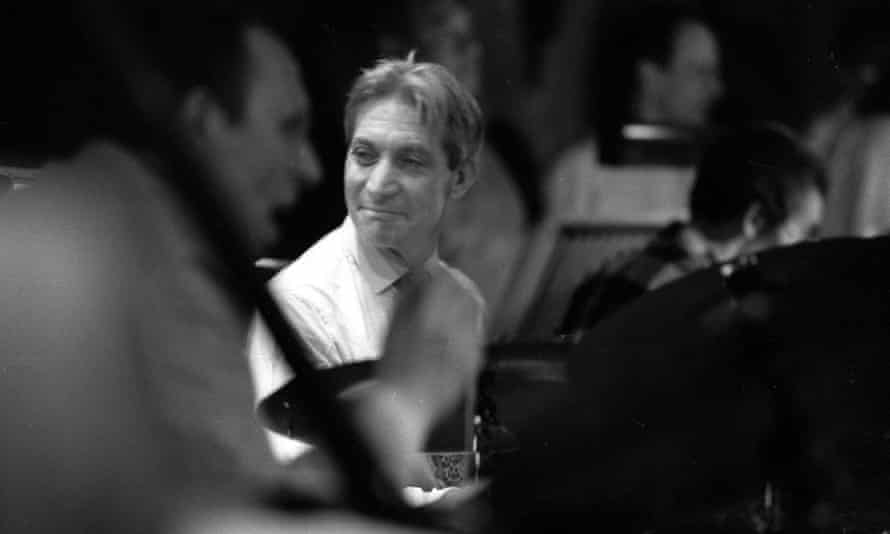Charlie Watts: a rock’n’roll legend whose true love was jazz
He may have backed the world’s most successful rock band, but the late drummer worshipped his jazz heroes through big bands and other projects

Everyone knew that Charlie Watts’s heart was always in jazz. Even when he grew his hair long and put on hippie garb while the Rolling Stones were going through their Satanic Majesties period, underneath he was still the cool bebopper who could see through the nonsense that surrounded his group and the rampaging egos at its heart.
Wisely, he never let his true musical allegiance show in his playing with the Stones. When they recruited him from Alexis Korner’s Blues Incorporated in January 1963, not long after he’d been serving an apprenticeship with trad jazz bands, he listened to the records of Jimmy Reed, Howlin’ Wolf and Muddy Waters in order to absorb the way that master Chicago blues drummers such as Earl Phillips, Fred Below and Elgin Evans kept things simple, soon appreciating that simplicity is often the hardest thing of all to achieve.
His personal adaptation of their discreet approach, concentrating on a firm backbeat and avoiding any form of decoration, turned out to be perfect for the Stones as the volume rose and the venues grew in size, but it could hardly have been further from the styles of the great modern jazz drummers he had grown up worshipping. The likes of Max Roach, Art Blakey, Philly Joe Jones and Elvin Jones had freed the drum kit from its subordinate role, enabling them to become full participants in the music, adding a running commentary to the improvisations of horn players such as Miles Davis and John Coltrane, sometimes even as an equal partner.
Growing up in a postwar prefab in Wembley, Watts had saved money to buy 78s by Jelly Roll Morton and Johnny Dodds, Charlie Parker and Dizzy Gillespie. When he was given his own first full kit, after getting a start by dismantling a banjo to use the body and the vellum as a makeshift drum, he painted the name “Chico” on the front head of what was known in those days as the bass drum. This was a homage to Chico Hamilton, a Los Angeles drummer who had played in a famous quartet with Gerry Mulligan and Chet Baker in the early 1950s before launching his own adventurous quintet, which enjoyed a vogue at the end of that decade and appeared on screen in the 1957 movie Sweet Smell of Success.
Never ashamed of his tendency towards hero-worship, Watts showed his colours in his first act of independent creativity. Ode to a Highflying Bird, published in 1964, when the Stones were hitting No 1 in the UK charts with It’s All Over Now and Little Red Rooster, was a slender volume of words and cartoons in which he used his skills as a trained graphic artist to illustrate the story of Parker (whom he later covered with his quintet), charmingly rendered as a kind of children’s fable.
His soulmate in the earliest incarnation of the Stones had been Ian Stewart, a piano player who loved boogie-woogie and other forms of jazz but who was soon eased out of the performing lineup on account of his looks and persuaded to take over the job of road manager instead. In the late 70s Watts moonlighted with Stewart in Rocket 88, a boogie and jump-blues band whose shifting lineup included guests such as Chris Farlowe, Zoot Money and Jack Bruce.
Always finding jazz clubs more congenial than the stadiums the Stones were now playing, in 1985 he filled the stage at Ronnie Scott’s with a 32-piece big band drawn from the cream of London’s jazz musicians. An extraordinarily eclectic lineup ranged from bop-era veterans to Courtney Pine, an unknown 21-year-old at the start of his career, who sat alongside his fellow tenor saxophonists Danny Moss, Bobby Wellins, Don Weller and Alan Skidmore. Jack Bruce played cello – his first instrument – and Stan Tracey was on piano. Watts sat happily at his kit between two other drummers, the older Bill Eyden and the younger John Stevens, as they played arrangements of classics such as Lester Leaps In, Stompin’ at the Savoy and Prelude to a Kiss. Mick Jagger and Keith Richards were in the house to cheer what Watts called the fulfilment of a childhood dream.
He was able to subsidise the project, which toured the US the following year, from his earnings as a Stone. In later years he took advantage of the band’s substantial downtime to return to Ronnie Scott’s and other venues with groups of more modest size and to record in 1996 a beautiful album of standards, Long Ago and Far Away, played by his quintet, a small orchestra and the singer Bernard Fowler. These warm, relaxed versions of songs such as Stairway to the Stars and In a Sentimental Mood, with Watts’s presence registered only by the gentle background rustle of wire brushes, were about as far from Sympathy for the Devil and Street Fighting Man as it is possible for music to get, but they were clearly heartfelt.
He was never patronising about the music he played with his fellow Stones but his long and loyal friendships with other jazz musicians, such as the saxophonist Peter King and the bassist Dave Green, whom he had known since childhood, were of great importance to him. Another close friend was the American drummer Jim Keltner, with whom he recorded a percussion-based album in 2000, again between Stones tours. Each of the record’s nine tracks took its title from the names of the drummers he idolised: Roach, Blakey, Kenny Clarke, Roy Haynes and so on. Yet again he was paying unforced and deeply felt tribute to the musicians who had enriched his life, as he, in a different register, enriched the lives of others.


Charlie Watts was a very special musician, no doubt about it. His talent was an essential part of the band's music. But what surprised me the most is that Charlie is the one of the old band to go first. I would have never put my money on him being the one.
ReplyDeleteI'm quite sure that Keith is immortal. ;<)
DeletePeople say Keef look as if he'd been dead five years! But he keeps on.
DeleteOne remarkable fact about Charlie Watts, for a musician, is that he was married to the same woman for over fifty years, which I admire. Also interesting for me (but probably not you), is that he, his wife and daughter could cap each other's Hancock's Half Hour quotes. As a fellow fan, I love that.
I don't know if it is on there, but here on Netflix there is a documentary on Keith. About 6 years old and excellent. Called Under the Influence.
DeleteHe's never been a handsome fella and sometimes those are the people who look better in old age. I think Lillian Hellman was like that. Craggy just suits some people.
And yes, I love it that Charlie was such a family man. Would love to see that show. With all the British shows that are available, there are still so many I can't get.
The Hancock programme started on the radio (the old Light Programme here) and was IMO much better than the TV series. I have a few old tapes and a couple of audio CDs. You might be able to get the latter. I recommend New Year's Honours and Sunday Afternoon. Brilliant writing and perfect ensemble playing. They're all good! Ay de mi, there were so many good comedy programmes on the radio at one time.
DeleteI expect that is true over here, too, but all before my time. All the radio before TV. I will look into this. And pray tell, what is "ay de mi"?
DeleteI was never a huge Rolling Stones fan but, Charlies Watts was different from the rest IMO.
ReplyDeleteI was/am, and yes he was different. I loved 'em all.
DeleteI am a Rolling Stones fan too, Nan, - "Keef" is immortal - nothing would dare kill him!
ReplyDeleteI really enjoyed reading this article and thought how much I would like the album Long ago and far away, being a sucker for those old standards (Al Bowlly any one?)
Fond memories of playing the album 12x5 wish I still had it.
I still have mine!
DeleteAnd I bought Goodnight Sweetheart sung by Mr. Bowlly when I first watched the excellent, perfect Goodnight Sweetheart show. Have you seen it? He doesn't sing the theme song, but I bought his version. I am also a "sucker" for the old standards. The second Phoebe in the show is a singer and I bought her album of the old songs.
What a wonderful article, thanks for sharing that.
ReplyDeleteIt really was. No one can beat the Guardian when it comes to well-done obituaries!
Delete